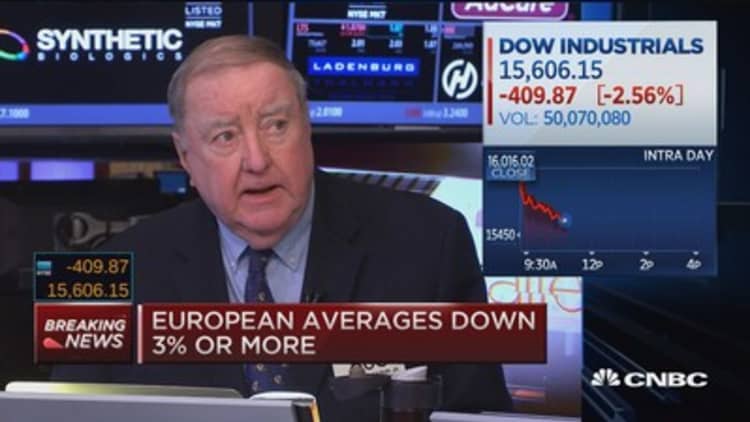
Investors should be paying attention to corporate earnings and forward-looking projections, but that isn't happening these days, said Art Cashin, director of floor operations for UBS at the New York Stock Exchange.
"I think right now earnings are not second class, but actually third class to the emotion that's going on, and until that emotion subsides somewhat, earnings will not matter that much," he said Wednesday on CNBC's "Squawk Alley."
On Wednesday, the Dow Jones industrial average sank more than 500 points in volatile trade as U.S. crude fell below $27 per barrel to lows going back to 2003. Even stocks like Netflix, which soared after hours Tuesday on blockbuster earnings, were dragged lower.
Cashin said such head-scratching market moves are now all about psychology, and rational connections have broken down at this point.
As oil prices plumb even lower lows, he said, speculation is swirling around a possible Cold War between Saudi Arabia and Iran, and conspiracy theorists assert Russia is intentionally destabilizing the Middle East to force a rebound in crude markets.
While Cashin preached skepticism, he cautioned that if oil prices get worse, weakness could spread beyond the industry.
Earlier in the day, Ray Dalio of Bridgewater Associates on CNBC's "Squawk Box" raised the specter of a depression should assets across the board remain under pressure in 2016. He also speculated the Federal Reserve may have to abandon its plans to further increase interest rates and instead embark on another round of quantitative easing.
Cashin said he is partly in Dalio's camp, reaffirming his belief that the central bank will bring rates back down to nearly zero after an initial hike in December, before the Fed ever reaches 1 percent.



But market participants may be getting ahead of themselves in predicting a recession, said Ben Mandel, global strategist at JPMorgan Asset Management.
"From the perspective of markets, clearly the recession probability has risen considerably, at least in so far as what's priced in, I think probably mistakenly," he told CNBC's "Squawk on the Street" on Wednesday.
What's given rise to heightened concern about an impending recession is the combination of tightening global financial conditions, evidence of a slowing U.S. economy at the close of 2015 and falling oil prices, Mandel said.
But each one of those shocks in isolation is not sufficient enough to derail U.S. growth, he said.
"Clearly the fact that they're all happening at the same time has caused markets to price in that more systemic recession scenario a little bit higher," he said. "A few months from now, when we look back at this experience, I think it'll be a false alarm."
Darrell Cronk, Wells Fargo Investment Institute president, also said the market is overdoing it when it comes to pricing in a recession. He said he believes oversupplied oil markets, which are driving stocks lower, are beginning to balance.
However, investors should be on watch for sovereign defaults among commodity producers in emerging markets with oil now trading in the $20-$30 per barrel range, he said Wednesday on "Squawk on the Street."
On Wednesday, the Institute of International Finance reported that investors took $735 billion out of stocks, bonds, currencies and other assets in the emerging markets.
"The dynamics don't look good there, the fundamentals don't look good, the currencies don't look good, the growth rates don't look good. It's a perfect storm of headwinds for most of the emerging markets. going forward," Cronk said.





